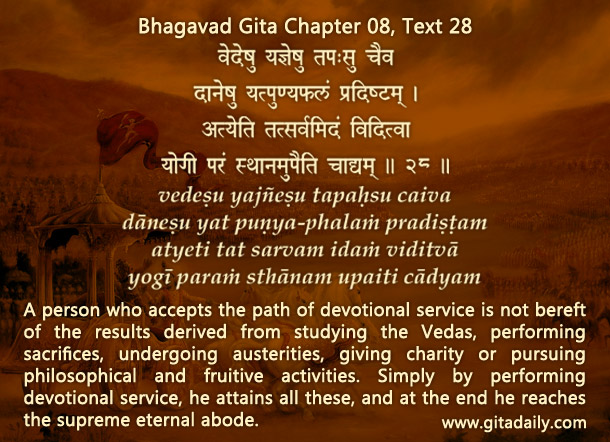Krishna ends the Bhagavad-gita’s eighth chapter with a bold declaration about the potency of bhakti-yoga: it provides everything that all other paths provide — and it provides more. Such a declaration naturally needs substantiation.
Krishna has already provided some substantiation in the eighth chapter. As contrasted with dhyana-yoga (08.08-13), bhakti-yoga provides the far easier way to remember and attain him (08.14). As contrasted with dhyana-yoga which requires yogis to time their death within finite windows of cosmic auspiciousness (08.23-26), bhakti-yoga just requires steady practice (08.27, 08.07) and Krishna will take care of one’s post-mortem destination (08.05).
Krishna provides further substantiation in the ninth chapter. Bhakti-yoga’s glories are ultimately his glories — it is due to his boundless love that he so generously graces those who strive to love him by practicing bhakti-yoga. Hence, the first half of the ninth chapter establishes his glories: everything works under his will (09.10); everything gets its functioning potency from him (09.18-19); everything is sustained by him (09.04) — and yet he exists transcendental to everything, unattached and unaffected (09.05).
Krishna then highlights four specific glories of bhakti-yoga. Unlike the temporary results from acts of piety (09.20-21), bhakti-yoga gives lasting results (09.22). Unlike the complexity of many religious rituals, bhakti-yoga can be performed with the simplest of things (09.26). Unlike puritan paths that disqualify those who succumb to misdeeds, bhakti-yoga embraces everyone, engaging and elevating them to the highest perfection (09.30-31). Unlike caste-centered paths that reject the lowborn, bhakti-yoga opens itself to the lowest of the so-called lowborn and powers them to the highest perfection (09.32-33).
One-sentence summary:
To substantiate the superlative potency of bhakti-yoga in the eighth chapter’s last verse, Krishna precedes it with two comparative analyses and succeeds it with four comparative analyses in the ninth chapter.
Think it over:
- How does Krishna establish the potency of bhakti-yoga in the eighth chapter?
- How does Krishna establish the potency of bhakti-yoga in the ninth chapter?
- Which glory of bhakti-yoga appeals to you the most? How can you leverage that appeal to strengthen your bhakti practice?
***
08.28: A person who accepts the path of devotional service is not bereft of the results derived from studying the Vedas, performing sacrifices, undergoing austerities, giving charity or pursuing philosophical and fruitive activities. Simply by performing devotional service, he attains all these, and at the end he reaches the supreme eternal abode.
To know more about this verse, please click on the image


JAPA is the way to attain BHAKTI YOGA
Hare Krishna 🙏
Thank You so much prabhu ji, I can now find some peace in this verse.
Ys,
Thank you for highlighting the four specific glories of Bhakti-yoga. As I’m currently teaching the 9th chapter, this insightful section comes at an appropriate time.
Good to know that this was helpful.